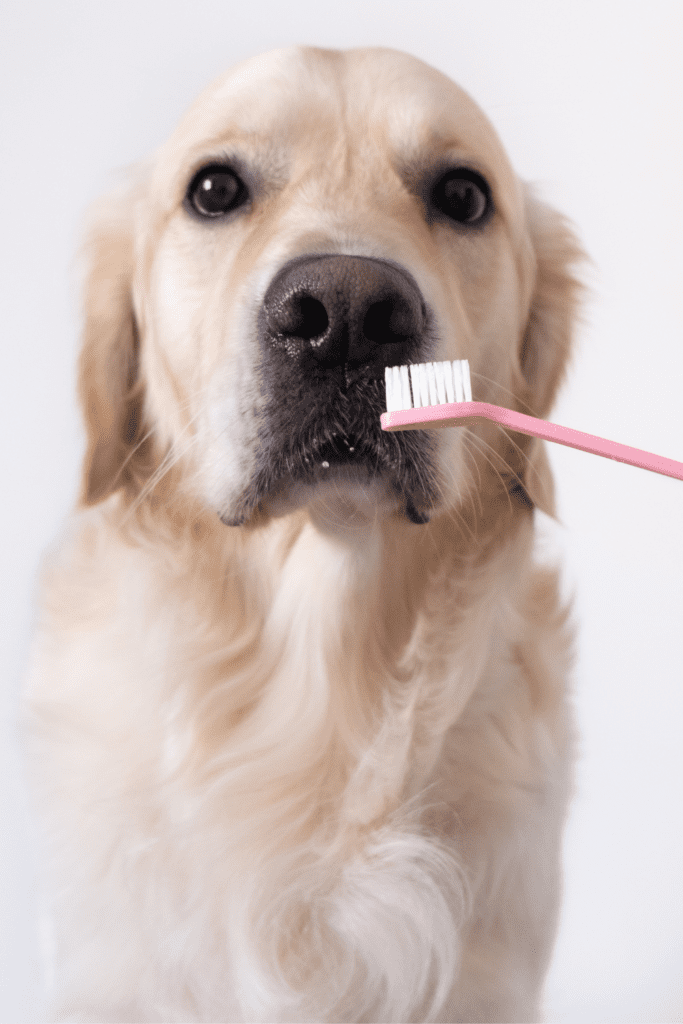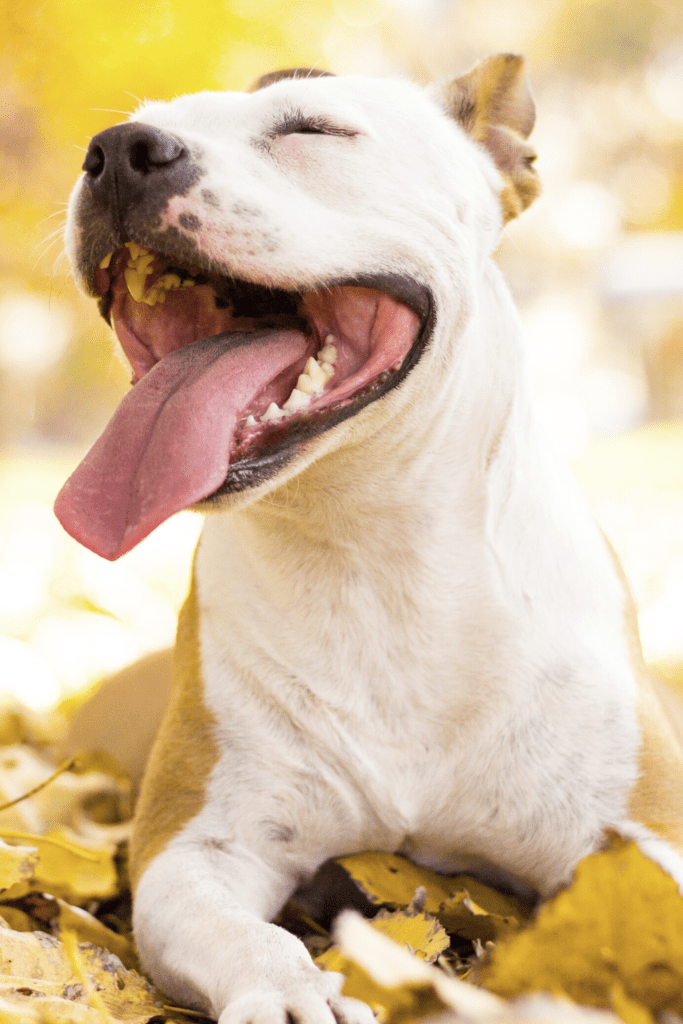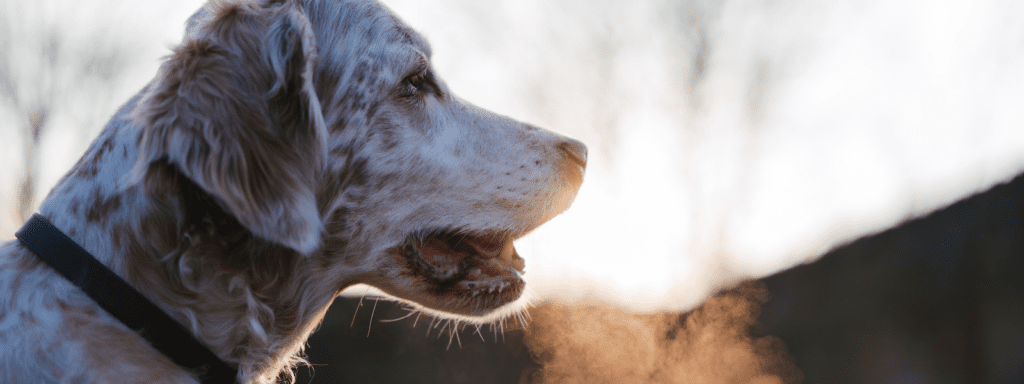Why do dogs have bad breath
 Synne Hemsen Berg
Synne Hemsen Berg
A healthy dog’s mouth should have a neutral smell. The causes of bad breath, also known as halitosis, can be due to poor oral hygiene, infection in the mouth, an imbalance in the digestive system/gut, disease or something the dog ate. Because bad breath can be a sign of serious illness, it is important to find the cause so that you can treat the dog appropriately.

Poor oral hygiene
Poor oral hygiene can become a serious problem and will lead to among other things, bad breath. Plaque and bacterial buildup cause inflammation in the gums or root canals/tooth decay can spread to your dog’s vital organs. It is recommended to brush your dog’s teeth every day with toothpaste safe for dogs (some human toothpaste contains xylitol, which is poisonous for dogs). You can read our blog about how to brush your dog’s teeth here. You can also give your dog chew toys and dentastix to promote oral health. Signs of poor oral health and pain in the mouth:
- plaque on the teeth (looks like stains)
- red inflamed gums
- bleeding gums
- loose teeth
- cracked or broken teeth
- your dog seems to avoid chewing his food, or even avoids eating – this can be due to pain
- head shyness (does not want to be touched on the head or snout)
Mouth injury and infections
Dogs love to chew on sticks and bones – which can cause injuries in the mouth. Teeth can break or crack from chewing on bones and sticks, and sharp edges can cut the gums. A cracked or broken tooth should always be looked at by the vet. Nala had a cracked upper molar, which had to be removed by a vet/animal dentist.
Foreign objects
Another issue that may result from chewing on sticks or bones can occur if they splinter. Fragments from sticks/twigs and bones can get lodged between the teeth, or in the gum or tongue – causing both pain and infection. The area around the splinter/foreign object will become red, inflamed, painful, and can start bleeding. Sometimes you can see the piece of bone/stick. In addition to a foul-smelling mouth, your dog may also struggle to eat because of the pain.
Do not remove the object/splinter without the aid of a vet. Removing the splinter may cause bleeding, further infection or other damage. Your vet will be able to remove the object safely and clean the area thoroughly.

Eating smelly things
If the smelly breath is acute and subsides after a few minutes/hours – your dog may have eaten something smelly such as a dead bird/animal or poop. Items with a pungent smell such as a dead bird/animal, poop or trash are especially appetizing for a dog. Secure your kitchen so your dog cannot get into the rubbish bin, and watch what she picks up in the garden and on walks to avoid the temptation of eating “bad stuff”. If eating smelly things becomes a recurring problem, it is advised to contact a dog trainer to help stop this behaviour. Eating dead birds/animals or poop can be dangerous to your dog’s health, so it is something that should be avoided. Read our blog about dogs eating poop to learn what you can do at home to stop this.
Imbalanced microbiome
The gut microbiome has a significant impact on your dog’s overall health. It is important for the proper digestion of nutrients, the immune system and mental health. The microbiome contains good bacteria, but if the microbiome is unhealthy, bad bacteria can flourish and among other things cause bad breath. If your dog has had antibiotics, this will often lead to an imbalance in the microbiome. Probiotics, good quality food and fibre can help to keep the gut microbiome happy and healthy. You can also add a tablespoon of organic, plain yoghurt or kefir to your dog’s diet to improve the microbiome. If Nala had gut issues, we used to give her 2-3 tablespoons of plain, organic yoghurt 3 times a week before bed.
Disease
Some serious diseases can cause bad breath. This includes liver disease, diabetes and kidney disease:
- Liver disease causes a particularly foul-smelling breath and is coupled with other symptoms like vomiting and loss of appetite. You will also see a yellowing of the gums, and the cornea (making the whites of the eye look yellow).
- Diabetes will often result in a sweet breath with hints of acetone (nail polish remover). This is because diabetes causes an increase in ketones in the blood that have an acidic sweet smell. The most common type of diabetes in dogs is type 1, which is the hereditary kind. Type 2 diabetes is a lifestyle disease – often related to obesity. Other signs of diabetes are:
- frequent urination
- hunger
- weight loss
- vomiting
- fatigue
- Kidney disease will cause your dog’s breath to smell like urine or ammonia. Your dog will also have sudden changes in appetite, drinking habits and weight.
If you suspect your dog has a disease that is causing halitosis, take her to the veterinarian or animal hospital immediately.

How to prevent bad breath
Firstly, you have to maintain good oral hygiene by removing plaque and preventing oral disease. Ideally, you should brush your dog’s teeth every day. It may be difficult to brush your puppies’ teeth, so start early to desensitize them to this routine. You can also give your dog dental chews to aid in maintaining good oral health. If you like to give your dog a rawhide to chew, make sure it is safe and of good quality. Read our blog on how to brush your dog’s teeth here.
Secondly, keep your dog’s gut and weight healthy with good quality food, fibre and probiotics. This prevents bad bacteria from flourishing in your dog’s digestive system. If your dog has an upset stomach, give her 2-3 tablespoons of plain, organic yoghurt or kefir before bedtime 3 times a week for two weeks or so.
Monitor your dog’s mouth regularly to check for:
- foreign objects
- cuts in the mouth
- red, swollen gums
- loose or cracked teeth
If you see a foreign object that is stuck in the mouth, you should take your dog to the vet to have the object safely removed and the area cleaned. Removing objects yourself can cause bleeding and further infection. Broken or cracked teeth might have to be removed.

